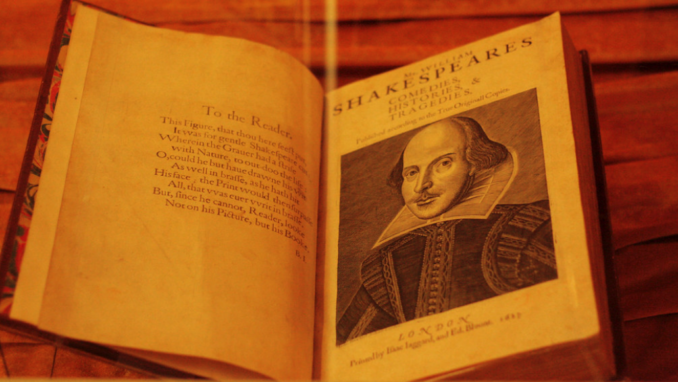
First Folio 2,
Andrea Parrish – Geyer – Licence CC BY-SA 2.0
Scorn not the Sonnet
Thus wrote Wordsworth, and it’s probably true that sonnets are second only to limericks in the poetry popularity stakes. Both forms have the advantage of being short and memorable.
But where did sonnets come from? They originated from Sicily in the thirteenth century, and there’s a defined type (the Petrarchan) that starts with an octave that rhymes abba-abba, then at the ninth line executes a volta (or turn) which enables the concluding sestet to express a comment or even a contradiction on what has gone before.
Here’s an example from Petrarch himself;
“The Vanity of His Passion” by Francesco Petrarca (“Petrarch”) (1304-1374)
O you, who hear in scattered verse the sound
Of all those sighs with which my heart I fed,
When I, by youthful error was misled,
Unlike my present self in passion drowned;
Who hears the woes, the pleadings that abound
Throughout my song, by hopes and vain griefs bred;
If ever true love its influence over you shed,
Oh ! let your pity be with pardon crowned.
But now full well I see how to the crowd
For a long time I proved a public jest:
Even by myself my folly is confessed:
And of my vanity, what’s left is shame,
Repentance, and a knowledge deep impressed,
That worldly pleasure is a passing dream.
It’s one of more than 300 that Petrarch wrote to his Laura. There’s debate about whether she was a real (married) woman or an abstract ideal, but I like to think that she was a typical poetic Muse – an unsatisfactory girlfriend unable or unwilling to dispense her favours.
Eventually, the sonnet caught on in England, and writers such as Sidney and Shakespeare promoted a newer form (abab cdcd efef gg) to take advantage of the greater rhyming possibilities in English. In this form it’s the final couplet that serves as the summing up of the poem. More recent writers tend to construct their own rhyming schemes; Shelley’s “Ozymandias” (surely the most famous sonnet ever?) has a rhyme scheme ababcdedfgfhfh (approximately!).
After Milton, the sonnet form declined, but it was revived by Wordsworth and the romantics like Shelley. Here’s Wordsworth with a Petrarchan form:-
Nuns fret not at their convent’s narrow room;
And hermits are contented with their cells;
And students with their pensive citadels;
Maids at the wheel, the weaver at his loom,
Sit blithe and happy; bees that soar for bloom,
High as the highest Peak of Furness-fells,
Will murmur by the hour in foxglove bells:
In truth the prison, into which we doom
Ourselves, no prison is: and hence for me,
In sundry moods, ’twas pastime to be bound
Within the Sonnet’s scanty plot of ground;
Pleased if some Souls (for such there needs must be)
Who have felt the weight of too much liberty,
Should find brief solace there, as I have found.
Petrarch can also be mocked! I rather like this one by Billy Collins:-
Sonnet
All we need is fourteen lines, well, thirteen now,
and after this one just a dozen
to launch a little ship on love’s storm-tossed seas,
then only ten more left like rows of beans.
How easily it goes unless you get Elizabethan
and insist the iambic bongos must be played
and rhymes positioned at the ends of lines,
one for every station of the cross.
But hang on here while we make the turn
into the final six where all will be resolved,
where longing and heartache will find an end,
where Laura will tell Petrarch to put down his pen,
take off those crazy medieval tights,
blow out the lights, and come at last to bed.
It must be admitted that sonnets do tend to express the egoism of the writer, and the next effort is no exception. A halting sonnet of my own pure brain (although one line has cheekily been nicked from a much better poet). Laura is one of the physiotherapists who helped me learn to walk again after my stroke.
Laura, I was dazzled by your youth
Your soft brown hair, and your kindly smile
Your bouncy step, your widening eyes; the truth
I’m always sad I only knew you for a while.
You helped me overcome my major deficiency
Burn off my rusts, and my deformity.
You and your friends were Angels sent to me
There never was a warmer remedy.
But now, two more years gone by
My heart is gripped by a fresh new pain.
I close my eyes, draw my breath, and sigh
Ghosts of the past haunt volumes of my brain
And this the worst; it’s the fear that I
May never see your sweet face again.
I’d encourage Puffins to write their own sonnets. There’s no money in it, but with a wrinkled brow and some pencil-sucking, you can create a work of art. And a thing of beauty is a thing forever, as John Keats nearly said.
The Goodnight Vienna Audio file
Audio Player



